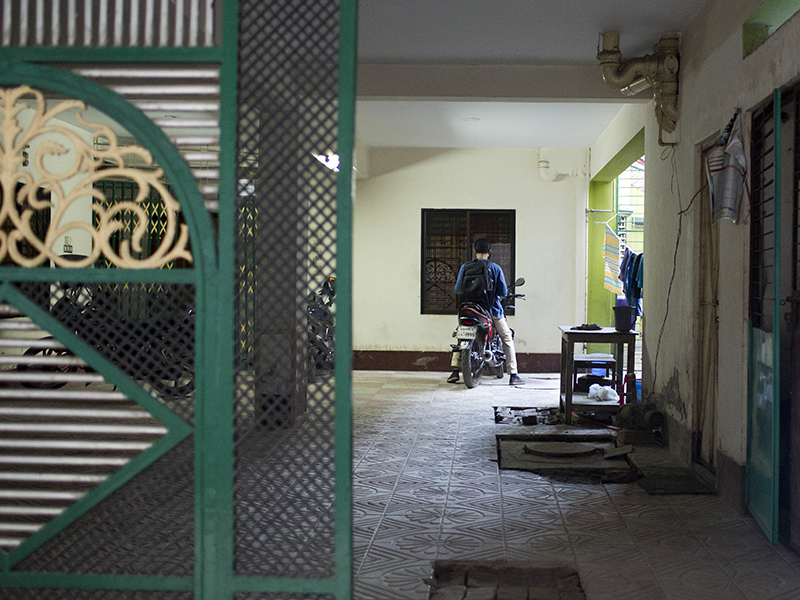
A man parks a motorcycle inside a building where 27-year-old Bangladeshi man Akayed Ullah, used to live in Dhaka, Bangladesh, Tuesday, Dec. 12, 2017. Bangladesh counterterrorism officers are questioning the wife and other relatives of Ullah, who is accused of carrying out a bomb attack in New York City's subway system, officials said Tuesday. (AP/A.M. Ahad)
The man accused of carrying out a bomb attack in New York City's subway system was influenced by the sermons and writings of a radical Muslim preacher but appeared to have no known links to local radical groups, Bangladeshi officials said.
The suspect, identified as Akayed Ullah, a 27-year-old Bangladeshi immigrant, had asked his wife in Bangladesh to read the writings and listen to the sermons of Moulana Jasimuddin Rahmani, the imprisoned leader of a banned group called Ansarullah Bangla Team, said Monirul Islam, a top official of the counterterrorism department.
The group has been linked to killings and attacks on secular academics and atheist bloggers in Bangladesh. Rahmani is serving time in prison for his involvement in the killings.
The wife was questioned in Bangladesh and told investigators that her husband discussed Rahman's writings with her during his last visit home, Islam said.
Ullah is accused of strapping a crude pipe bomb to his body and detonating it during rush hour Monday (Dec. 11).
Relatives and police said Ullah last visited his wife and newborn son in Bangladesh in September, after which he returned to the United States.
Counterterrorism officials questioned the wife and her parents before releasing her Tuesday night, Islam said, adding that investigators were currently questioning his brother-in-law and also planned to question any known close associates.
Ullah arrived in the United States in 2011 and the Department of Homeland Security said he was a lawful permanent resident of the U.S. who was living in Brooklyn. He came to the U.S. on a visa issued to him based on a family connection to a U.S. citizen.
U.S. law enforcement officials familiar with the investigation said Ullah had looked at Islamic State group propaganda online and told investigators in the United States he was retaliating against U.S. military aggression but had no direct contact with the group.
Ullah's uncle, Abdul Ahad, said Tuesday that the suspect mostly remained inside a small apartment in Dhaka's Hazribagh area when he visited, leaving only to offer prayers at a nearby mosque.
Investigators said Ullah had no criminal record in Bangladesh.
Muslim-majority Bangladesh is governed by largely secular laws, but the impoverished nation has struggled with a rise in radical Islam in recent years.
In July last year, five young men who reportedly belonged to the domestic militant group Jumatul Mujahedeen Bangladesh attacked a popular restaurant frequented by foreigners and wealthy Bangladeshis, leaving 20 hostages, including 17 foreigners, dead.
Advertisement
But even before that, a spate of smaller attacks had targeted secular academics, atheist bloggers, foreigners and members of the country's tiny Hindu minority.
The Islamic State group claimed responsibility for most of the attacks, including the one at the restaurant, but the government of Prime Minister Sheikh Hasina denied that the Sunni extremist group has any presence in the impoverished country. The government has blamed the attacks on local radical groups.







